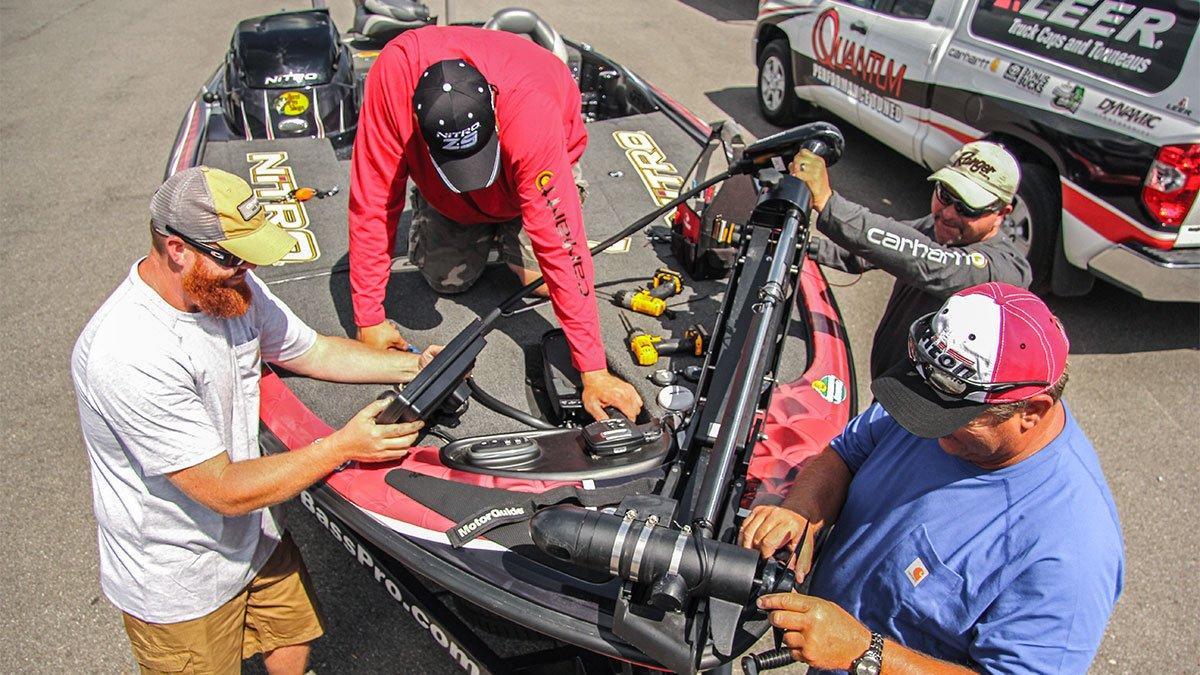Terry “Big Show” Scroggins has won nearly $2 million as a professional bass angler. But if not for the group of dedicated men that follow the B.A.S.S. tournaments around the country to repair any mechanical failures the anglers endure, Scroggins might still be floating helplessly down the St. Lawrence River.
“Two years ago at the Bassmaster Elite tournament, I took off running down the St. Lawrence River and my outboard’s lower unit failed about 10 miles downstream. The current was strong, and I was helpless,” Scroggins said.
“I called the service yard guys back at the ramp, they answered immediately, used Google Earth to figure out what ramp I was closest to, loaded up their truck with a new lower unit, changed mine on the ramp, and got me going again. I went on to catch an 18-pound limit of bass. They literally saved my day.
“And here’s the thing, that river current is so strong, that had they not got there in perfect time, the current, combined with my lack of power, would have lead to me missing them. It was a one shot deal. They made it happen. Otherwise, I might still be drifting down the St. Lawrence. Those guys are like family—they’re the best boat mechanics in the world and they get there fast when we need them.”
Andy Stallings is one of the family members to whom Scroggins is referring. Stallings has been a patriarch of the service crew for 15 years, providing mechanical fixes wherever the top-level bass tournaments need him to be.
“I’m on the road over 200 nights a year doing this job. I get to see a lot of neat parts of the country, but mostly, I enjoy the friendships I share with the anglers and their families.
“Teamwork is the No. 1 thing among the service crew—we’re a brotherhood. We’re out here to do one job; and that’s to keep these anglers fishing and get them back on the water fast when something fails.”
In addition to Stallings who focuses on boats and trailers, others like Michael White, Mike Cochran, James Johnson and David “Happy” White each have their specialties too. It could be sonar, outboard motors or even hydraulic anchor systems. But each knows a little bit—or a lot—about everything on a bass boat.
Big jobs like replacing failed lower units on an outboard motor at a remote boat ramp aren’t uncommon, but most of the time, trailer repairs, trolling motor props, broken sonar transducers and busted stern safety lights are more a part of the daily repairs. Those can be dealt with in the makeshift service yard that is typically set up in a parking lot near tournament headquarters at each event, and is often home to some of the best food anywhere, as these guys love to cook and eat when they’re not turning wrenches.
“We each have our specialty and some of us even work for competing boat brands, but we always work together because two or three heads and an extra set of hands always gets the job done faster, easier and better than one man working alone,” said Stallings as he used channellocks to crack meat from a lobster the crew would later share for dinner.












